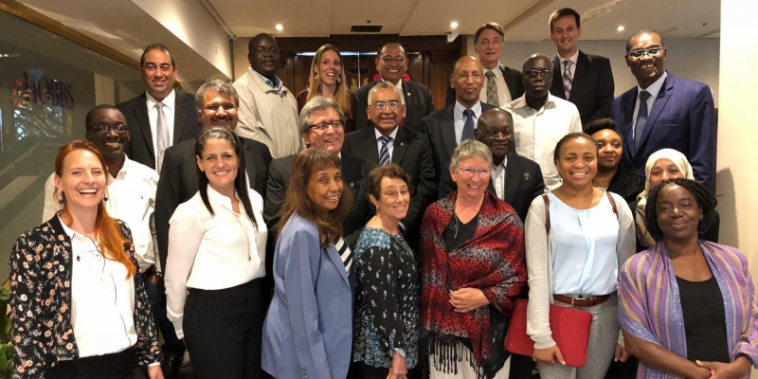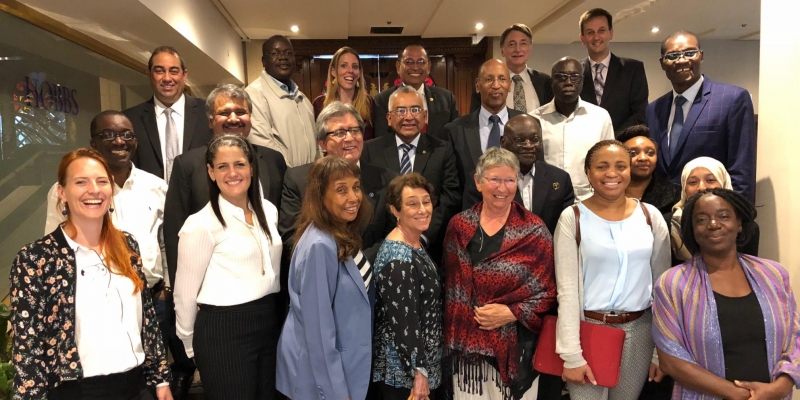Empowering FIGO Member Societies

Tens of thousands of women die every year as a result of complications related to unsafe abortion in Africa. In fact, earlier this year WHO confirmed that the risk of dying from an unsafe abortion was the highest in Africa.
While there is no individual country in Africa where abortion services are completely outlawed, women in the region are sadly often unable to access safe abortion services to the full extent of their national laws. To understand the legal provision of safe abortion, the medical fraternity need to understand the circumstances under which safe abortion services in our public health facilities are expected to be provided.
This week I, as the FIGO Regional Advisor for the Eastern Central Southern Africa Region on FIGO’s Safe Abortion Project, attended the Needs Assessment Finalisation and Phase II Planning Workshop in London, alongside FIGO member societies from Cameroon, Cote d’Ivoire, Mozambique, Panama, Peru, Uganda and Zambia and of course colleagues from Kenya.
For FIGO to invest in content provision and capacity building to our national societies, there was a need to first thoroughly understand the current situation both in the country and in terms of capacity of the national society to lead advocacy efforts. Therefore, in Phase I of the project a needs assessment has been completed in each of our ten countries.
On Day 1 of the workshop, teams from each country shared their country and regional experiences and prepared and presented their country specific plan of actions based on the findings from the now completed needs assessment. This proved to be a good opportunity to learn how different countries cope with their problems, and to discuss good practices. This sharing of experiences was one most important motivations to the country teams while attending the meeting.

Pictured: FIGO Safe Abortion Project Meeting, London, 28-29 May 2018
By bringing teams together we were able to use the other countries as a bench mark for improving one another’s advocacy, and sharpen our skills as well, and get motivated to make changes to our own countries position. The meeting also widened our knowledge on an issue that is of global importance, therefore allowing us to discuss and gain a wider scope of understanding and knowledge. Sharing experiences from very far countries with totally different cultural background was quite enriching to all of the participants.
Health professionals, being the front line workers, have a strong role to play in advocating for safe abortion services within our institutions, and in demonstrating how increased access and provision to safe abortion services will save the lives of women in their country. Unfortunately, women in our region are still dying from unsafe abortion, not because of the restrictive laws but also because some health professionals have not decided to offer the services as needed.
We are now finalising our country action plans which will contribute to preparations for Phase 2 of the project. During this second phase we hope that the national societies will be empowered, both financially and in terms of human resource, so that we can advocate strongly for safe abortion services.
Building the capacity of our national society is necessary to ensure that they can host meetings with key stakeholders, including parliamentarians, civil society organisations, government agencies, media and various health professionals to advocate for widen scope under which safe abortion services will be provided.
If our leaders, and wider stakeholder groups, commit to ensuring provision of safe abortion services for all women they will also contribute to reducing the maternal mortality ratio as outlined in SDG3.1.
Lives saved – Goals achieved.
This news item has been contributed by:
Prof. Guyo W. Jaldesa
Associate Professor of Obstetrics and Gynaecology,
College of Health Sciences, University of Nairobi
FIGO ECSA Regional Coordinator, for initiative to prevent unsafe abortion.
Director Africa Coordinating Centre for the Abandonment of FGM (ACCAF)
Nairobi, Kenya